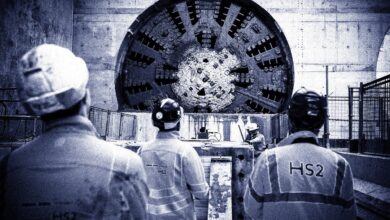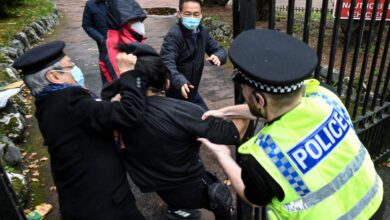Pro-Satanism and anti-birth control: Inside the ‘extreme’ world of UK anti-abortion activism

For most people in the UK, the world of anti-abortion activism is an unfamiliar domain, with many unaware of the extremity of views held by these campaigners. From linking abortion to satanism, to being opposed to sex and anti-birth control, to calling for abortions to be banned in cases of rape, the beliefs espoused by many anti-abortion activists are at loggerheads with wider societal attitudes.
After all, British social attitudes surveys demonstrate people of faith are almost as likely to believe women should have the right to choose an abortion as non-religious individuals. While a study, carried out by YouGov and MSI Reproductive Choices UK, previously found nine in 10 UK adults think women should be able to access abortion services in Britain and specifically identify as being “pro-choice”. In other words, the vast majority of Britons believe in a woman’s right to choose what she does with her body, even if they may be personally against abortions.
But anti-abortion activists take a highly different approach; instead employing a vast range of tactics to try and stop women from having abortions. Many resort to forceful, aggressive strategies, including shouting “mum” or “murderer” at women accessing clinics, as well as distributing medically erroneous pamphlets and following women down the street. And the problem of protesters targeting women outside abortion clinics is a widespread one – with more than 100,000 women attending clinics targeted by anti-abortion demonstrations in 2019.
However, the anti-abortion movement consists of a range of organisations which hold varying beliefs and adopt differing tactics. The anti-abortion movement in the UK can be divided into two main categories. The first being catholic groups and the second being evangelical protestant groups, with each faction embracing highly different campaigning approaches.
“The more in your face protests are organised by evangelical protestants,” Rachael Clarke, of the British Pregnancy Advisory Service (BPAS), the UK’s largest abortion provider, tells The Independent. “They stand outside clinics with placards, they often have boards with scripture, or a microphone attached to their head, they call women ‘murderers’, they use graphic images.”
Ms Clarke explained these organsiations espouse an absolutist interpretation of the bible – adding that they refer to themselves as being abolitionists. “What they mean is they are against all abortions at any stage for any reason – including if there is a threat to life of the woman if she continues with her pregnancy,” she adds.
The campaigner noted they are opposed to so-called “heartbeat bills”, an already extreme form of legislation popular in some US states which ban pregnancy terminations once cardiac activity is detected. This can occur at around six weeks of pregnancy, a point at which many women are not even aware they are pregnant, as it is a mere two weeks after a period is missed. While, doctors warn this view is erroneous, saying embryos do not have a developed heart at this point.
Campaigners against “heartbeat bills” dispute the legislation as they think abortion should be banned from the very start of conception, Ms Clarke explains. ”They often wear body cameras,” she adds. “It is creepy they have cameras. What women accessing abortion clinics feel is that they are being filmed while they access healthcare.”
Ms Clarke noted the tactics adopted by those anti-abortion activists who are Catholic are more “insidious” – adding this often involves following women seeking abortions at clinics down the street, referring to them as “mum”, talking about their baby, and handing them rosary beads. “They perpetrate the lie that abortions cause breast cancer,” she adds. “While they think abortion as a whole is wrong, they are aware of how out of step this is with society as a whole.”
The campaigner said the two branches of anti-abortion activism do not like each other very much, as she explained in her experience, they do not mix. But Ms Clarke concluded the divergent tactics used by varying anti-abortion activists all have one thing in common: the fact they are “incredibly distressing” for those seeking abortions.
Ms Clarke argued anti-abortion activism in the UK is characterised by a “cycle of recruitment and radicalisation” outside clinics. Activists will persuade a woman outside a clinic not to access an abortion and then get those women on board to campaign to prevent other women from getting terminations, she said.
“These women they are recruiting are vulnerable,” Ms Clarke adds. “Not just because of the situation they are in, but because they are taken away from an established clinical pathway with trained mental health support, and are essentially waylaid by strangers at the side of the road.”
Ms Clarke said large swathes of the anti-abortion movement are opposed to sex education as she warned they are opposed to sex outside marriage – adding they believe the purpose of sex is to have children rather than being about pleasure.
“The pro-life movement is connected to those who are anti sex education, to the ‘war on woke’, to being anti gay marriage,” she reflects. “It is a web that is all connected. They weedle their way into different parts of the conversation by rebranding themselves. It is a new name and new campaign but the same people. Some of them don’t believe in routine contraception and don’t believe in abortion. It is hard to say how many are anti-birth control – more people are anti-emergency contraception than anti condoms.”
Ms Clarke said she believes the majority of anti-abortion activists in the UK are opposed to abortions in instances of rape, incest, fatal feotal anomality, or if the pregnancy places the woman’s life at risk – with Dr Pam Lowe, a sociologist who specialises in anti-abortion activism in the UK, also believing this to be the case.
“Most anti-abortion activists in the UK do not believe in abortions in instances of rape, incest, fatal feotal anomality, or if the woman’s life is at risk,” Dr Lowe, a senior lecturer in sociology and policy at Aston University, adds. “It is basically a complete ban. In their world view, abortion is almost the worst thing you can do as a woman, they feel it has a fundamental impact on women’s mental and physical health so they argue rape is not as bad.”
While some campaigners opposed to abortion deem rape survivors having an abortion as almost equilavent to a second rape, she adds. An Ealing Council Consultation Report Appendix, referenced in Dr Lowe’s book Anti-Abortion Activism in the UK, shines a light on this issue.
“I accompanied a friend into the clinic who had been raped and become pregnant,” a local resident, from Ealing in West London, cited in the report, says. “A woman approached her with a model foetus, saying that my friend had ‘other choices apart from killing her baby’. My friend became very distressed and said she had been raped. The woman then said that this was ‘very sad but it wasn’t the baby’s fault’.”
Dr Lowe argued banning abortion in instances when a woman’s life is at risk is “beyond cruel”, adding abortions should be considered a human right as without them “you can die” from health complications.





